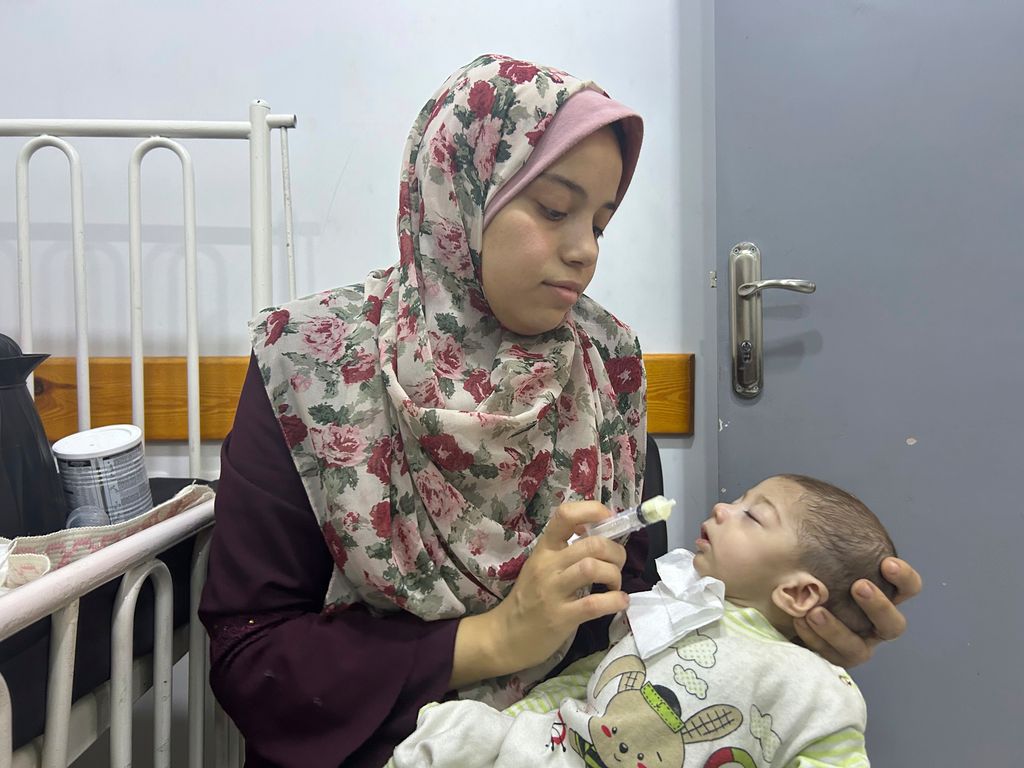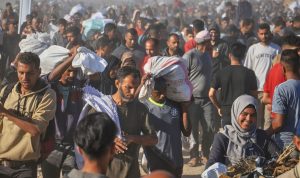Randa Al Dohdar with her daughter Ruqqia.
Ruqqia rarely cries. Usually she just lies there quietly and sleeps. When her mother drips milk into her mouth with a syringe, the little girl hardly even opens her eyes. Ruqqia weighs 2,900 grams and is 53 centimeters long, the size of a newborn. But she is seven months old. "She couldn’t move for the first 12 weeks,” says Randa Al Dohdar, 29. "The doctor told me that she might die at any moment.”
Ruqqia in the clinic in Gaza City.
Randa Al Dohdar, Ruqqia's mother
IV infusion for Ruqqia in the clinic. Supplies of medicines and specialized food for malnourished children could begin running out soon.
Since Ruqqia’s birth, Dohdar has been making regular visits with her daughter to the hospital run by the Patient’s Friends Benevolent Society (PFBS) in Gaza City. The windowless room is tiny and stuffy, crammed with three beds, each holding a malnourished baby. It smells like wastewater and garbage. But the mother is nevertheless happy that her daughter is at least being helped. "Whenever I take Ruqqia home with me, her condition grows worse."
Suzan Maroof, a malnourishment specialist who is also providing treatment to Ruqqia, says that 200 children come to the clinic each day. One out of five of them is malnourished, she says, with one-in-10 severely malnourished. Doctors and nurses in other hospitals and medical facilities in the Gaza Strip have also reported an increase in such cases, telling stories of desperate mothers who make soup from grass to quell their hunger. Or of children who search through the rubble in the hope of finding anything that might be edible. According to UNICEF, a total of 9,000 children have been treated for acute malnourishment since the beginning of the year.
Malnourishment specialist Suzan Maroof.
If Israel’s blockade of the Gaza Strip continues, up to 71,000 girls and boys could be acutely malnourished over the next 11 months, with one in five residents facing starvation by September. That is the finding of an analysis conducted by the internationally recognized IPC Initiative, a UN-funded project that monitors food security around the world.
Rénald Ménard, health worker with Doctors Without Borders
"Malnourishment impairs cognitive and physical capabilities, and its effects cannot be reversed,” says Rénald Ménard, a healthcare worker with the aid organization Doctors Without Borders who works in a primary healthcare center in the Mawasi area near Khan Younis. It is particularly dangerous for children under the age of five, he says. Their growth is stunted, wounds heal more slowly and they get sick more quickly, which can lead to death in the atrocious hygienic and medical conditions in the war zone.
For the time being, humanitarian organizations are still helping malnourished children with special, energy-rich food. But if more supplies don’t reach the Gaza Strip quickly, work may have to be suspended. Doctors Without Borders believe their medical supplies, including those used to treat malnourishment, will only last for another two weeks. Save the Children estimates they have six weeks of supplies left. In the PFBS clinic where Ruqqia is receiving treatment, rationing has already begun.
The article you are reading originally appeared in German in issue 22/2025 (May 24th, 2025) of DER SPIEGEL.
Israel loosened the blockade in last week in response to international criticism and allowed small amounts of aid into the Gaza Strip. But it is far too little to alleviate hunger on the long term.
"It changes nothing,” says Ménard, the aid worker with Doctors Without Borders. The population doesn’t just need a bit of rice, he says, but a sustainable and varied diet over the long term. "The Geneva Convention is clear,” he says. "People have a right to safety, healthcare, water and food. They are receiving none of that.”
A truck full of aid supplies at the Kerem Shalom crossing on May 22.
Ménard says they first began seeing malnourished children a year ago, but now their numbers are climbing rapidly. When he arrived in Gaza almost two months ago for his current shift in Gaza, they were treating two inpatient children suffering from acute malnourishment. Now, there are 10 of them. "These are children who would otherwise die if nothing was done.”
Rénald Ménard, health worker with Doctors Without Borders
Ménard believes there are many more children affected. With hardly any cars and donkey carts available, he says, their families are often unable to make it to a clinic. And even if transportation is available, it is often unaffordable. Beyond that, the heavy bombardments and renewed ground offensive have frequently made it too dangerous to leave emergency shelters or homes.
"We know that children are already dying from the consequences of malnourishment,” says Ménard. "And there will be more such cases.” Children like Ruqqia, who have a preexisting condition, are particularly at risk.
People lined up at a soup kitchen in Gaza City.
Randa Al Dohdar doesn’t know exactly what is afflicting her daughter. Comprehensive medical examinations of children are hardly possible in the Gaza Strip any longer. Numerous hospitals have had to close down because they were bombed or are located in the combat zone. Others are often only able to provide basic care.
But Dohdar thinks she knows the reason for her daughter’s condition. When she became unintentionally pregnant in early 2024, Israel was also allowing very little food into the region. Almost nothing was finding its way into the northern part of the Gaza Strip, where Randa Al Dohdar lives, since it was virtually sealed off by the Israeli army. In Gaza, these months are referred to as the "time of the first famine.”
"I ate bread made of flour and leaves. There was no milk, eggs or meat,” says Dohdar. "I was constantly hungry.” She says she had to flee from emergency shelter to emergency shelter in Gaza City and was forced to walk long distances, inhaling the smoke and dust from the bombings all the while. Not to mention the constant fear.
When contractions began one night in October 2024, she experienced sharp pains, Dohdar says. But there were airstrikes all around her and she had to wait until the next morning to go to the hospital. The doctors immediately initiated a Caesarean section – and found that Ruqqia was underdeveloped.
Randa Al Dohdar with her daughter Ruqqia.
"I have always wanted a daughter,” Dohdar says quietly. She spends hours sitting next to Ruqqia’s bed, lovingly taking care of her. "I am so afraid of losing Ruqqia.”
According to the World Health Organization, 57 children have died of malnourishment since the beginning of Israel’s complete blockade on March 2. That number is based on statistics kept by the Health Ministry in the Gaza Strip, which is controlled by Hamas. Independent verification is impossible.
A precise accounting is made even more difficult by the fact that the cause of death is often complex. Children do not simply starve to death. They die of infections that their body, weakened by malnourishment, is unable to ward off. Or of wounds that don’t heal. Or of chronic illnesses that are intensified by the lack of nutrition and a shortage of the specialized foods they need. And on top of all that come the constant challenges of life in a war zone: the stress and mortal fear caused by displacement and constant bombardment; the lack of hygiene; the shortage of clean water.
Such was the fate of Yahya, one of the 57 children.
He was born in March 2023 after a normal pregnancy. His mother says over the phone that Yahya was a healthy newborn and his birth was free of complications. His mother is 34 years old and has three other children. She has asked to be referred to as Umm Yahya in this article, the mother of Yahya. The editors know her real name.
When Yahya was five months old, she realized that something wasn’t quite right, his mother says. He was diagnosed with protein intolerance and the doctor prescribed a special milk that had to be imported. The family bought the milk and Yahya grew and gained weight, says his mother. "He weighed nine kilograms when he was seven months old.”
Yahya as a health baby. He developed normally early on in his life and weighed nine kilograms at the age of seven months.
Dieses Bild enthält Gewalt oder explizite Inhalte.
Yahya, shortly before his death. Weakened by a lack of specialized nourishment and by injuries.
Then the war began. The family fled from Shujaiya, which lies close to the border with Israel, and since then, says the mother, they have been uprooted a total of 20 times. They are now living in a tent on a former playground in Gaza City. Their neighborhood was almost completely destroyed in the first months of the war.
The specialized milk for Yahya became far more difficult to obtain once the war started, and before long, it couldn’t be procured at all. Whenever Yahya’s condition worsened, she would bring him to Rantisi Children’s Hospital in Gaza City, says his mother. But in November 2023, the hospital was partially destroyed by the Israeli army.
"I was forced to give Yahya food that he couldn’t tolerate. That led to a dramatic worsening of his health.” The doctors tried to arrange for the boy to be evacuated abroad, she says. But it didn’t work.
Then, on March 19 of this year, the house where they had found shelter was shelled. "Yahya suffered several broken bones and we took him to the hospital. He couldn’t eat anymore. His weight dropped to just 3,000 grams and his condition rapidly worsened,” says Umm Yahya. "He died exactly one month after the bombardment.”
She describes how horrifying it was to watch his agonizing death. How he cried from hunger and pain. "And there was nothing I could do to help him.”
Now, she fears for the survival of Yahya’s siblings because the family hardly has any food at all. She and her husband only eat once a day, she says, giving their children everything else. "I am afraid they might die just like Yahya.”







